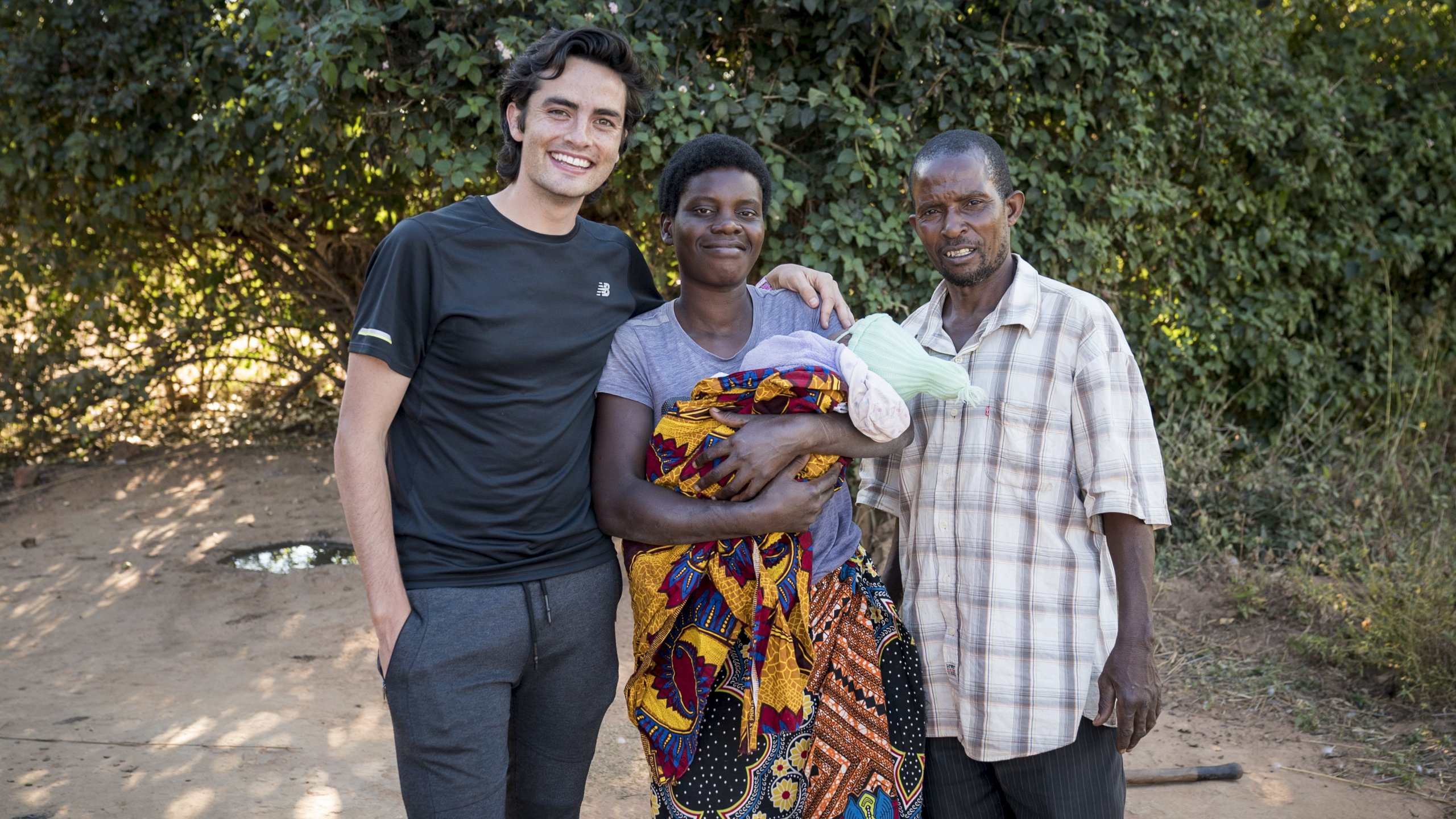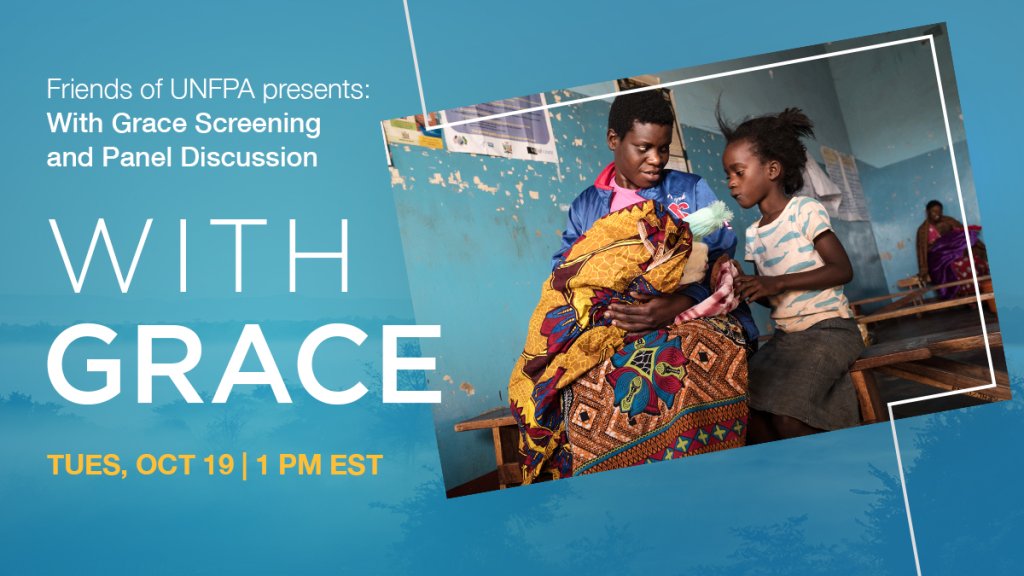USA for UNFPA Presents: A Q&A with With Grace Filmmaker Austin Meyer
USA for UNFPA is hosting a public virtual screening of With Grace, a new National Geographic short documentary film. The event is taking place on Tuesday, October 19 at 1 PM EST and you can register here.
Directed by Austin Meyer, With Grace follows the joys, fears, and challenges that Grace encounters during her pregnancy and childbirth in rural Zambia, a country with one of the world’s highest rates of maternal and newborn death. With Grace offers an intimate glance into the motherhood experience of women in underserved communities around the world.
Watch the trailer for With Grace.
Amanda Seller, the Chief Executive Officer of USA for UNFPA, will host a conversation with Austin Meyer, the creator of With Grace, Gift Malunga, UNFPA Zambia’s Country Representative, and Jyoti Tewari, a Health Systems Advisor for UNFPA’s East and Southern Africa Regional Office.
In advance of the screening, Austin spoke with us about his film. Here is the full interview:

USA for UNFPA (FOU): Hi Austin, first, congratulations on With Grace. It is such a beautiful and moving film. And thank you for joining us today. I’d love to understand more of the story behind With Grace. Where did your interest in sharing stories like Grace’s come from?
Austin: Thank you very much! My interest in telling stories around maternal and infant health started back in 2015 when I was selected as the winner of the New York Times international reporting trip fellowship with the Pulitzer Prize-winning columnist, Nicholas Kristof. As the winner of this fellowship, I was fortunate enough to travel and report with Kristof in India. While there, we covered maternal health and malnutrition. I became fascinated by how cost-effective it is to focus public health initiatives around this time period known as the first 1000 days.
The foundation of human potential is built in the first 1000 days of life. 270 days during pregnancy and 730 days leading up to a child’s second birthday.
FOU: Right, UNFPA ensures that pregnant women have the care they need throughout their pregnancy to be safe and healthy. After birth, UNFPA provides mothers and newborns with the support they need to thrive during this critical time.
Austin: Exactly. It is during this time that the brain develops most rapidly and when the immune system is strengthened. But it is also the time in which potential can be undermined by poor sanitation, succumbing to treatable diseases, mosquito bites, or a sip of dirty water.
Even though the first 1000 days are such a critical time for mothers and children around the world, it has never gotten the attention or funding it deserves. So, as a storyteller, I set out to raise awareness about the challenges mothers face around the world and to shine a light on some of the most overlooked health issues in the world.
FOU: What inspired you to specifically create With Grace? What about Grace’s story did you find most compelling?
Austin: Thanks to the support of health organizations and networks of community nurses in Zambia, I interviewed dozens of pregnant women before ever taking out my camera. When I did my first pre-interview with Grace, I remember a few key characteristics that stood out to me. First, she represented a demographic that often lacks the resources and support needed to have the highest chance of a healthy delivery. She lived in a very rural area, she had her first child at age 17, she dropped out of school, and she had a history of four home deliveries.
But then she said that this was the first baby she was planning to deliver at a clinic. As a documentarian, I am always on the lookout for change: characters changing, systems changing, perspectives changing. I knew that her decision to deliver at a clinic for the first time would allow me to explore many changes in the story.
The other big thing that stood out to me was that Grace was so personable. She has a big laugh and smile, she was comfortable sharing her story, and my intuition told me that her personality would resonate on screen.
FOU: What surprised you most about your experience of being with Grace during this period in her life?
Austin: I was surprised to see how involved the entire community was when it came to helping mothers have successful deliveries. At the clinic where Grace delivered, there are four professional staff who attend to a population of 10,061 people. They work all day and sleep at night.
To cover the nighttime hours, rotating enclaves within the village sent volunteers to sleep in the clinic in case someone came in with an emergency, such as labor. When that emergency came in, the volunteer would run to the doctor’s home, wake them up, and bring them back to the clinic.
Over and over I saw examples like this where, in the face of a lack of resources, community members stepped up to help others.
FOU: How did the process of creating With Grace change you?
Austin: I have never worked on a project that has changed me in such a profound way. On a personal level, every day working on this film was a crash course in humility. Even after reporting on this theme for the Times, and doing countless hours of research before arriving in Zambia, it was clear on day one that I didn’t know anything. The only way I was going to be successful in creating a compelling and honest story was if I put my ego aside and spent all my time listening, observing, and understanding others.
As a documentarian, this project also took my skills to a new level. It was a dive into the deep end, in which I was the director, producer, cinematographer, and editor. I typically filmed people speaking in various Zambian languages that I didn’t understand and I was tracking a story with an uncertain outcome. All these challenges inspired me to work harder than ever before, and have helped me become a better storyteller.
FOU: Why do you think it’s important to share Grace’s story with the USA for UNFPA community?
Austin: USA for UNFPA promotes the health, dignity, and rights of women and girls around the world. This community understands the value of that. This community understands that investing in women and girls is our way forward.
Sheryl WuDunn and Nicholas Kristof write in their book Half The Sky, “Maternal health generally gets minimal attention because those who die or suffer injuries overwhelmingly start with three strikes against them: They are female, they are poor, and they are rural. Women are marginalized in the developing world, They are an expendable commodity.”
My hope is that this film can play a part in bringing attention to what women like Grace are facing around the world. Every 11 seconds a pregnant woman or newborn dies. Almost all of these deaths, child and mother, are from preventable causes. Investing in the well-being of mothers and their babies creates a brighter and more prosperous future for us all.
